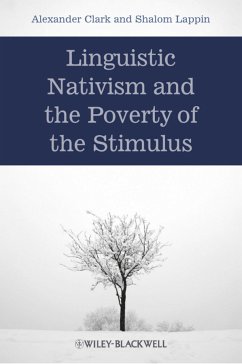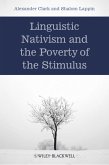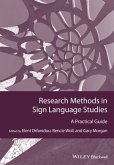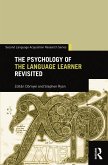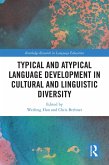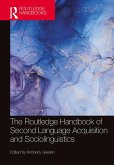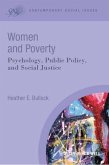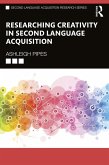This unique contribution to the ongoing discussion of language acquisition considers the Argument from the Poverty of the Stimulus in language learning in the context of the wider debate over cognitive, computational, and linguistic issues. * Critically examines the Argument from the Poverty of the Stimulus - the theory that the linguistic input which children receive is insufficient to explain the rich and rapid development of their knowledge of their first language(s) through general learning mechanisms * Focuses on formal learnability properties of the class of natural languages, considered from the perspective of several learning theoretic models * The only current book length study of arguments for the poverty of the stimulus which focuses on the computational learning theoretic aspects of the problem
Dieser Download kann aus rechtlichen Gründen nur mit Rechnungsadresse in A, B, BG, CY, CZ, D, DK, EW, E, FIN, F, GR, HR, H, IRL, I, LT, L, LR, M, NL, PL, P, R, S, SLO, SK ausgeliefert werden.
"This book is not only very pertinent, but also succeedsin eschewing most of the polemical excess that tends to engulf usall in this field It's not an easy book.. but I thinkit gives some sense of what the enterprise is about. AlexClark describes it, at one point, as an exercise in clearing theground - and it succeeds in sweeping away certain comfortableassumptions that are often made in this area, concerning (forinstance) the irrelevance of negative evidence, what languages areprovably unlearnable, and the role of the Chomskyhierarchy." (New Books in Language, 8 June2012)
"Most of all, it challenges basic concepts inmainstream linguistics. It rejects key tenets of UG in the light ofadvances in machine learning theory, and research in thecomputational modelling of the language acquisition process. Itexposes so-called proofs supporting the poverty of stimulus, andreveals alternatives that are formally more comprehensive than theexplanations previously provided by UG theories, and empiricallymore likely to match natural language acquisitionprocesses." (Linguist List, 2011)
"This book is not only very pertinent, but alsosucceeds in eschewing most of the polemical excess that tends toengulf us all in this field. It's not an easy book ...but I think it gives some sense of what the enterprise isabout. Alex Clark describes it, at one point, as an exercisein clearing the ground - and it succeeds in sweeping awaycertain comfortable assumptions that are often made in this area,concerning (for instance) the irrelevance of negative evidence,what languages are provably unlearnable, and the role of theChomsky hierarchy." (New Books in Language, 2012- review and interview available at http://newbooksinlanguage.com/2012/06/08/alexander-clark-and-shalom-lappin-linguistic-nativism-and-the-poverty-of-the-stimulus-wiley-blackwell-2011/)
This highly readable, but game-changing book shows to what extentthe `poverty of the stimulus' argument stems from nothing more thanpoverty of the imagination. A must-read for generativelinguists.
Ivan Sag, Stanford University
For fifty years, the "poverty of the stimulus" has driven"nativist" linguistics. Clark and Lappin challenge the PoSand develop a formal foundation for language learning. Thisbrilliant book should be mandatory reading for anyone who wants tounderstand the most fundamental question in linguistics.
Richard Sproat, Oregon Health and ScienceUniversity
Clark and Lappin provide a brilliant and wide-rangingre-examination of one of the most important questions in cognitivescience: how much innate structure is required to support languageacquisition. A remarkable achievement.
Nick Chater, Professor of Behavioural Science, University ofWarwick
This comprehensive cutting-edge treatise on linguistic nativismskillfully untangles the human capacity to effortlessly learnlanguages, from claims that this capacity is specific tolanguage.
Juliette Blevins, CUNY Graduate Center
"Most of all, it challenges basic concepts inmainstream linguistics. It rejects key tenets of UG in the light ofadvances in machine learning theory, and research in thecomputational modelling of the language acquisition process. Itexposes so-called proofs supporting the poverty of stimulus, andreveals alternatives that are formally more comprehensive than theexplanations previously provided by UG theories, and empiricallymore likely to match natural language acquisitionprocesses." (Linguist List, 2011)
"This book is not only very pertinent, but alsosucceeds in eschewing most of the polemical excess that tends toengulf us all in this field. It's not an easy book ...but I think it gives some sense of what the enterprise isabout. Alex Clark describes it, at one point, as an exercisein clearing the ground - and it succeeds in sweeping awaycertain comfortable assumptions that are often made in this area,concerning (for instance) the irrelevance of negative evidence,what languages are provably unlearnable, and the role of theChomsky hierarchy." (New Books in Language, 2012- review and interview available at http://newbooksinlanguage.com/2012/06/08/alexander-clark-and-shalom-lappin-linguistic-nativism-and-the-poverty-of-the-stimulus-wiley-blackwell-2011/)
This highly readable, but game-changing book shows to what extentthe `poverty of the stimulus' argument stems from nothing more thanpoverty of the imagination. A must-read for generativelinguists.
Ivan Sag, Stanford University
For fifty years, the "poverty of the stimulus" has driven"nativist" linguistics. Clark and Lappin challenge the PoSand develop a formal foundation for language learning. Thisbrilliant book should be mandatory reading for anyone who wants tounderstand the most fundamental question in linguistics.
Richard Sproat, Oregon Health and ScienceUniversity
Clark and Lappin provide a brilliant and wide-rangingre-examination of one of the most important questions in cognitivescience: how much innate structure is required to support languageacquisition. A remarkable achievement.
Nick Chater, Professor of Behavioural Science, University ofWarwick
This comprehensive cutting-edge treatise on linguistic nativismskillfully untangles the human capacity to effortlessly learnlanguages, from claims that this capacity is specific tolanguage.
Juliette Blevins, CUNY Graduate Center

